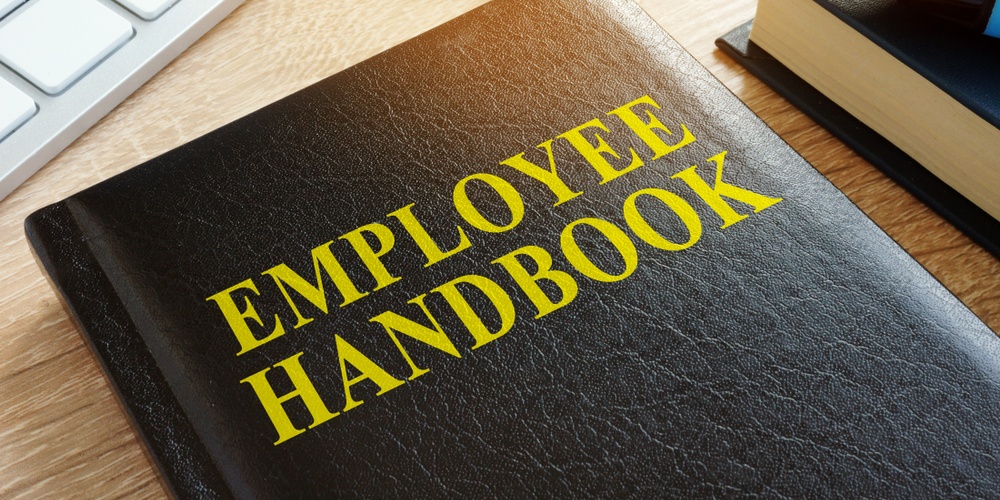Employee handbooks may be more common at huge corporations, but they are important and useful for companies of all sizes. An employee handbook is a great way to nail down your company’s policies and procedures, communicate expectations to your employees, and protect your company from liability. Writing all this information down in one place can ensure that you’re building a solid foundation for your company and its HR practices, and it makes it easier to scale up as you grow your business.
What Is an Employee Handbook?
An employee handbook compiles all of your company’s policies, procedures, benefits, and expectations in one document. While having an employee handbook is not a legal requirement, it can make it easier for you to comply with your legal obligations as an employer. It’s important to remember that writing an employee handbook is an ongoing process, not a one-time project. A good handbook should be updated continuously to reflect the changes in your company and the world.
Why Do You Need an Employee Handbook?
An employee handbook can provide many benefits for both your company and its employees. These are five important reasons to have an up-to-date employee handbook.
1. An employee handbook is a great orientation tool
New employees will often have questions that a well-written employee handbook can answer. Your handbook should cover your company’s history, values, and mission, which is a great way to begin immersing your new hires in your company culture. The handbook should also include information about your company’s policies and procedures, which should answer many of your new employees’ more straightforward questions. This can make the onboarding process more efficient and make sure your new employees don’t miss any of the basics they’ll need to know about life at your company.
2. An employee handbook sets clear expectations
An employee handbook is an excellent way to clearly communicate information like your company’s dress code, how to request time off, what your performance review process looks like, and how to make a formal complaint if there’s a problem. Asking your employees to read this information allows them to clearly see what your company expects from them. Providing these policies in writing allows your employees to refer back to them when necessary and makes sure that all employees and managers have access to the same information.
3. A handbook helps your company treat employees consistently
Relying on onboarding conversations and individual managers to convey policies can result in inconsistent communication and unclear expectations. If you don’t have this written down, some employees might miss details they need to know and be unsure of where to find what they need. With a written employee handbook, everyone has access to the same information and can easily review it when they have questions.
Having your company policies written down can also help with fair and consistent management when there’s a dispute over something covered by the handbook. For example, if an employee may be violating the dress code, having that dress code written down and available to everyone in the company allows managers and HR to make a more straightforward enforcement decision.
4. A handbook showcases your company’s benefits package
The benefits your company offers are an essential part of your employees’ compensation, and your employee handbook is a great place to showcase them. You can use the handbook to provide details about your health insurance plan and to list other specific benefits your company provides. The employee handbook can also highlight benefits like workers’ compensation insurance that your company pays for but isn’t especially visible to most of your employees. A good benefits package is an important factor in attracting and retaining the best employees, and your employee handbook can be a good place to show yours off.
5. An employee handbook can help your company win unemployment claims and lawsuits
An employee handbook can serve as a useful piece of evidence that your employees were aware of a certain rule, especially if you have them sign a form confirming that they have received and read the document. This can be incredibly helpful for your company in a situation such as an unemployment dispute in which an employee was fired for violating a rule listed in the handbook.
When should you update your employee handbook?
It’s a good practice to implement a regular schedule for updating your employee handbook. An employee handbook loses much of its usefulness if it contains outdated or irrelevant information. Reviewing and updating your employee handbook once a year is a good place to start, but you should also make updates whenever there are changes to your company, the law, or social norms that could impact your policies. For example, a societal shift in how formally workers in your industry need to dress could prompt you to relax your dress code, or a new law could change the benefits you need to offer. Offering your handbook electronically is a good way to simplify updating and distributing it.
Who should update your employee handbook?
If you have an in-house HR team, they should be the ones working on the handbook. However, if you don’t have an HR department or your department isn’t taking advantage of the benefits a good employee handbook can provide, it may be time to consider outsourcing. A Professional Employer Organization can partner with your company to write your employee handbook and manage other HR needs.



